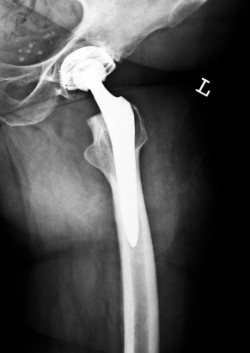Top Class Actions’s website and social media posts use affiliate links. If you make a purchase using such links, we may receive a commission, but it will not result in any additional charges to you. Please review our Affiliate Link Disclosure for more information.

A number of medical journals and magazines have published this announcement. The February 2014 issues of the Journal of Bone and Joint Surgery, the American Association of Hip and Knee Surgeons, the American Academy of Orthopaedic Surgeons, and The Hip Society each included a consensus statement warning against the risks associated with metal on metal hip modules. These complications have been linked to a number of hip recalls and lawsuits in the past 10 years.
According to a statement from the orthopaedic group, there have been more than 1 million metal on metal hip replacement surgeries conducted worldwide since 1996. However, the national joint registries recently announced that the total failures of metal-on-metal hip devices are most likely two or three times higher than originally thought, based on recent evidence. This estimate stems from not only the number of reported device failures, but also adverse biological reactions patients had to the device.
Essentially, the orthopaedic group believes that part of the reason the number of device failure is thought to be so high stems from not only the device simply malfunctioning, but the harm it brought upon the patient. The biological complication the experts referred to is known as metallosis, or blood-metal poisoning. This complication has been reportedly occurring since the release of the first set of metal-on-metal hip modules, and has been labeled as one of the most important factors in the device’s failure rates.
According to U.S. Food & Drug Administration (FDA) warnings, metallosis occurs from metal-on-metal hip implants because of friction in the device’s ball-and-socket joint. This interaction releases metal ions into the bloodstream, which causes a variety of other problems. Other complications associated with this device include infection, pain, immobility, rusting and complete device failure.
Other contributions to the device’s high failure rate included the initial belief that metal-on-metal devices would be superior to their ceramic and plastic cousins due to the stronger and more durable material. Additionally, most metal-on-metal hip modules could be customized for each patient, and would allow more mobility for younger hip replacement patients.
Many of the metal on metal hip systems were released without comprehensive pre-clinical trials because they had been released under the FDA’s 501(k) policy. This policy allows a product to pass through to market without premarket testing, so long as the manufacturer can prove it is just as efficient as a similar product already on the market. Essentially, the orthopaedic group admits that these products were used without much prior testing, which unnecessarily exposed patients to serious complications.
In general, metal hip implant lawsuits are filed individually by each plaintiff and are not class actions.
Do YOU have a legal claim? Fill out the form on this page now for a free, immediate, and confidential case evaluation. The attorneys who work with Top Class Actions will contact you if you qualify to let you know if an individual lawsuit or class action lawsuit is best for you. Hurry — statutes of limitations may apply.
ATTORNEY ADVERTISING
Top Class Actions is a Proud Member of the American Bar Association
LEGAL INFORMATION IS NOT LEGAL ADVICE
Top Class Actions Legal Statement
©2008 – 2024 Top Class Actions® LLC
Various Trademarks held by their respective owners
This website is not intended for viewing or usage by European Union citizens.
Get Help – It’s Free
Join a Free Metal Hip Replacement Class Action Lawsuit Investigation
If you or a loved one had a metal-on-metal hip implant that failed or caused serious complications, you may be entitled to compensation. Hip replacement lawsuits are being filed now against multiple companies, including Stryker, Biomet, DePuy, Zimmer, and Wright. See if you qualify to take legal action by filling out the form below.
An attorney will contact you if you qualify to discuss the details of your potential case at no charge to you.
Oops! We could not locate your form.












